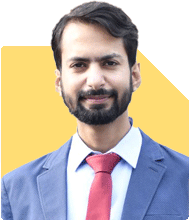Neeraj Batra | Answer |Ask -Follow
CA, CS, Commerce Expert - Answered on Aug 10, 2023
He has been teaching mathematics to CA, CS and commerce aspirants for over 11 years.
He has taught accounts and finance to IRS officers at the National Academy of Direct Taxes for three years and conducted numerous seminars at schools, colleges and MBA institutes in India.
Under his mentorship, several students have topped the competitive exam and secured All India Ranks.
Batra topped CA Intermediate (PCC) exam from Nagpur in 2009 and completed his CA and CS at the age of 21.
He has also cleared CFA (USA) Level 1.... more

Hello everyone... I'm CMA final student and I'm very depressed the institute and the course is becoming joke day by day, the demand is reducing too. After passing inter both group in 1st attempt I was shocked that I couldn't get any internship anywhere not even my profile was considered for interview. At first I thought that may be it's happening because of corona because I passed in December 2020 term but after waiting for 2 years still I don't get any chance now I'm very insecure about my future career even I pass will I be able to secure any job..I don't whether u should continue or not.... please guide me what should I do l..is there any course I can do now btw my age 23 so it's not like I'm so young or I still have so much time.
You may like to see similar questions and answers below
Prof Suvasish Mukhopadhyay | Answer |Ask -Follow
Career Counsellor - Answered on May 05, 2025
Mayank Chandel |2576 Answers |Ask -Follow
IIT-JEE, NEET-UG, SAT, CLAT, CA, CS Exam Expert - Answered on May 28, 2025
Dr Nagarajan J S K |2578 Answers |Ask -Follow
NEET, Medical, Pharmacy Careers - Answered on Sep 08, 2025
Radheshyam Zanwar |6754 Answers |Ask -Follow
MHT-CET, IIT-JEE, NEET-UG Expert - Answered on Dec 23, 2025
Purshotam Lal |70 Answers |Ask -Follow
Financial Planner, MF and Insurance Expert - Answered on Dec 23, 2025
Purshotam Lal |70 Answers |Ask -Follow
Financial Planner, MF and Insurance Expert - Answered on Dec 23, 2025
Samraat Jadhav |2522 Answers |Ask -Follow
Stock Market Expert - Answered on Dec 23, 2025
Samraat Jadhav |2522 Answers |Ask -Follow
Stock Market Expert - Answered on Dec 23, 2025
Samraat Jadhav |2522 Answers |Ask -Follow
Stock Market Expert - Answered on Dec 23, 2025
Samraat Jadhav |2522 Answers |Ask -Follow
Stock Market Expert - Answered on Dec 23, 2025
Samraat Jadhav |2522 Answers |Ask -Follow
Stock Market Expert - Answered on Dec 23, 2025
Dr Nagarajan J S K |2578 Answers |Ask -Follow
NEET, Medical, Pharmacy Careers - Answered on Dec 23, 2025
Samraat Jadhav |2522 Answers |Ask -Follow
Stock Market Expert - Answered on Dec 23, 2025

























